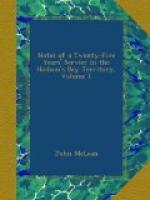In 1842 the Governor and Committee issued positive orders that the beavers should be preserved, and every effort made to prevent the Indians from killing them for a period of three years. This was, in a great measure, “shutting the stable door after the steed was stolen.” The beavers had already been exterminated in many parts of the country; and even where some were yet to be found, our injunctions to the natives to preserve them had but little weight. To appease their hunger they killed whatever game came in their way, and as we were not permitted to buy the beaver skins, they either converted them into articles of clothing for themselves or threw them away. Now (1845) the restriction is removed, and the beavers have sensibly increased; but mark the result: the natives are not only encouraged but strenuously urged to hunt, in order that the parties interested may indemnify themselves for their lost time; and ere three years more shall have elapsed, the beaver will be found scarcer than ever.
It is thus evident that whatever steps their Honours may take to preserve the game, the attainment of that object, in the present exhausted state of the country, is no longer practicable.
As to the Company’s having ever issued orders, or recommended any particular measures for the preservation of the larger animals, male or female, the statement is positively untrue. The minutes of the Council are considered the statutes of the land, and in them the provision districts are directed to furnish so many bags of pemmican, so many bales of dry meat, and so many cwt. of grease, every year; and no reference whatever is made to restrictions of any kind in killing the animals. The fact is, the provisions must be forthcoming whatever be the consequence; our business cannot be carried on without them.
That the natives wantonly destroy the game in years of deep snow is true enough; but the snow fell to as great a depth before the advent of the whites as after, and the Indians were as prone to slaughter the animals then as now; yet game of every description abounded and want was unknown. To what cause then are we to ascribe the present scarcity? There can be but one answer—to the destruction of the animals which the prosecution of the fur-trade involves.
As the country becomes impoverished, the Company reduce their outfits so as to ensure the same amount of profit,—an object utterly beyond their reach, although economy is pushed to the extreme of parsimony; and thus, while the game becomes scarcer, and the poor natives require more ammunition to procure their living, their means of obtaining it, instead of being increased, are lessened. As an instance of the effects of this policy, I shall mention what recently occurred in the Athabasca district.
Up to 1842 the transport of the outfit required four boats, when it was reduced to three. The reduction in the article of ammunition was felt so severely by the Chippewayans, that the poor creatures, in absolute despair, planned a conspiracy to carry off the gentleman at the head of affairs, and retain him until the Company should restore the usual outfit.




